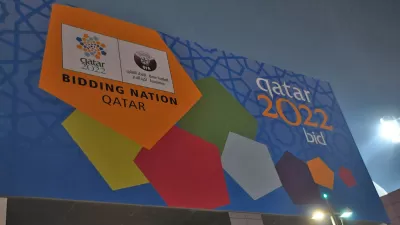With plans to greatly reduce seating capacities and export an entire stadium, Qatar is hoping to reduce the negative long-term impact of its hosting of the 2022 World Cup.
The small nation is trying to avoid creating"white elephant" stadia that cannot reach capacity crowds after the 2022 international soccer tournament is over.
"Now the architects have unveiled detailed plans that will allow organizers in the tiny Gulf nation to remove as many as 170,000 seats - including one entire stadium - from nine of the venues and send them to 22 locations in the developing world.
At a stadium conference in Doha this week, they said the initiative was aimed at insuring the World Cup would leave a lasting legacy.
"If we build up to the capacity which FIFA requires, afterward we would have a lot of white elephants around this area," said Karin Bertaloth, whose firm is designing six new stadiums and two that will be upgraded. "I don't think Qatar needs this capacity. We have the concept to build first tier of the stadium permanently and the second would only be for 2022.""
FULL STORY: With plans for 12 World Cup stadiums, Qatar looks for ways to avoid building 'white elephants'

Planetizen Federal Action Tracker
A weekly monitor of how Trump’s orders and actions are impacting planners and planning in America.

Maui's Vacation Rental Debate Turns Ugly
Verbal attacks, misinformation campaigns and fistfights plague a high-stakes debate to convert thousands of vacation rentals into long-term housing.

Restaurant Patios Were a Pandemic Win — Why Were They so Hard to Keep?
Social distancing requirements and changes in travel patterns prompted cities to pilot new uses for street and sidewalk space. Then it got complicated.

In California Battle of Housing vs. Environment, Housing Just Won
A new state law significantly limits the power of CEQA, an environmental review law that served as a powerful tool for blocking new development.

Boulder Eliminates Parking Minimums Citywide
Officials estimate the cost of building a single underground parking space at up to $100,000.

Orange County, Florida Adopts Largest US “Sprawl Repair” Code
The ‘Orange Code’ seeks to rectify decades of sprawl-inducing, car-oriented development.
Urban Design for Planners 1: Software Tools
This six-course series explores essential urban design concepts using open source software and equips planners with the tools they need to participate fully in the urban design process.
Planning for Universal Design
Learn the tools for implementing Universal Design in planning regulations.
Heyer Gruel & Associates PA
JM Goldson LLC
Custer County Colorado
City of Camden Redevelopment Agency
City of Astoria
Transportation Research & Education Center (TREC) at Portland State University
Jefferson Parish Government
Camden Redevelopment Agency
City of Claremont



























